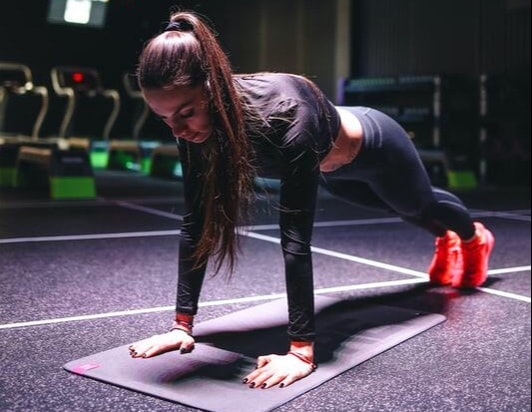|
We all know this one: try to get in at least 10,000 steps per day.
However, such black-or-white, one-size-fits-all solutions are sometimes outdated or unfounded or lack the necessary nuance to be correct or helpful, which is why I’m not usually a fan of them. But is this one bad? Or is there something to it?
0 Comments
The new year stands before us, like a chapter in a book, waiting to be written. We can help write that story by setting goals. According to research, fitness goals are some of the most popular New Year’s resolutions.
However, most “New Year’s resolutioners” are unsuccessful. When I was working as a personal trainer in a commercial gym, I witnessed the same cycle every year. Come January 1st, the gym would be flooded with new members. By March, most of them would disappear, never to return… until the following January. So, if you’ve ever set fitness resolutions that didn’t stick, you’re not the only one. Of the few studies conducted on this topic, most seem to show that the majority of participants abandon their resolutions after a few months. For example, in 1985, a study by Norcross and colleagues reported that 77% out of 200 participants stuck to their resolutions for a week, but only 40% were still keeping up with them after six months. If you’re thinking that a 60% failure rate after six months sounds pretty grim, that’s not all. In reality, if you’re volunteering for a study measuring the success rate of New Year’s resolutions, you’re likely more motivated to achieve your goals than the average person. Moreover, after the participants set their resolutions on an initial phone call with the New Year’s Resolution Project staff, they received seven follow-up phone interviews for the next two years. If you know someone’s going to check on your progress every few months, you’ll probably take your resolutions far more seriously than if you were left to your own devices. So, in real life, New Year’s resolutions likely fail even more often than in research. However, since you’re reading this blog post, you are more motivated than the average person. By applying the four steps covered in the article, you’ll have better-than-average odds of succeeding, too. You’ve come to the right website. Let’s start your year with a bang. Each person’s workout is really different. It’s tailored to be what’s most needed for them. Everybody’s different. If you want to build as much muscle as you can, doing a list of random exercises for 3 sets of 12 reps each just won’t cut it, unless you’re a true beginner. What you need is an effective muscle-building program.
The components of any good program are called training variables, which can be structured together in a variety of ways, depending on your fitness level, goals, and needs. In this article, we’ll focus on three of the most important variables for muscle growth:
We’ll cover what they are, what the current scientific literature can tell us about them in relation to muscle growth, and how to implement them in your own program. Ready for the brain gains? If you can build a muscle, you can build a mindset. Are you at the beginning of your fitness journey and want to design your own workouts? Then you’re in the right place. Read this article and learn to apply basic principles of exercise science to create your own full-body training sessions.
First of all, I’ll be completely honest with you: A single blog article is no substitute for a personal trainer or coach, who can teach you correct form and draw upon their expertise and experience to craft a training program suited to your current fitness level, skills, and individual body. But not everyone has access to a coach, and some training is better than no training. As a beginner, what you need the most are consistency and practice, so you can get great results for months with a simple, well-structured full-body workout. I trained this way three days a week for six months when I started bodybuilding. I have clients who do the same, even if they’re not beginners anymore, and still get incredible results. Now that I’ve spent long enough singing the praises of full-body training, let’s get into the basics. In order to create a science-based muscle-building workout, you need to understand:
Ready? Strap in. Understanding motivation is one of the most important things we can do in our lives, because it has such a bearing on why we do the things we do and whether we enjoy them or not. I have recently posted a poll on my Instagram stories, asking my followers if they were staying on top of exercise.
“No” was the most popular answer. In another poll, I asked “Why?” and offered two options: “No guidance” and “Low motivation”. “Low motivation” received an overwhelming 100% response. What many of us might not realise is that your initial motivation is fuelled by a sense of novelty and inspiration to achieve success. Unfortunately, neither of the two lasts long. Your shiny new training program becomes old news in a couple of weeks. And your long-term goal of losing 50lbs can seem too far away when you step on the scale and you’ve only lost half a pound this week. Once your starting levels of motivation are running low, don’t wait to wake up one day and find them miraculously restored. Spoiler alert: It won’t happen. Instead, become the architect of your own motivation. One way to do this is to accomplish a workout when it’s the very last thing you want to do. This will boost your confidence and thus perpetuate a positive feedback loop of success, followed by a sense of accomplishment and renewed motivation, followed by repeated success. In this article, I will cover my top tips to do exactly that. |
Nikias TomasielloWelcome to my blog. I’m an online fitness coach with a passion for bodybuilding, fantasy, and bread. Want to work with me? Check out my services!Archives
May 2024
Tags
All
|
Follow me on social media |
Get in touch |
© 2018-2023 Veronica Tomasiello, known as Nikias Tomasiello – All rights reserved






 RSS Feed
RSS Feed